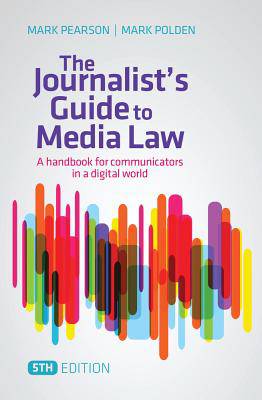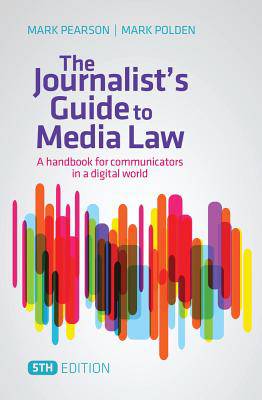
- Afhalen na 1 uur in een winkel met voorraad
- Gratis thuislevering in België vanaf € 30
- Ruim aanbod met 7 miljoen producten
- Afhalen na 1 uur in een winkel met voorraad
- Gratis thuislevering in België vanaf € 30
- Ruim aanbod met 7 miljoen producten
Zoeken
The Journalist's Guide to Media Law
A Handbook for Communicators in a Digital World
Mark Pearson, Mark Polden
Paperback | Engels
€ 44,95
+ 89 punten
Uitvoering
Omschrijving
We are all journalists and publishers now: at the touch of a button we can send our words, sounds and images out to the world. No matter whether you're a traditional journalist, a blogger, or handling social media for a company, everything you publish or broadcast is still subject to the law. But which law? This widely used practical guide to communication law is essential reading for anyone who writes or broadcasts professionally, online or in traditional media. It shows how to publish or upload what you want, while staying on the right side of the law and behaving ethically. This fifth edition has been substantially revised to reflect the international nature of online media. It covers defamation, contempt, confidentiality, privacy, trespass, intellectual property, and ethical regulation, as well as the special challenges of commenting on criminal allegations and trials. Recent cases and examples are used to illustrate key points and new developments. It includes a new chapter on the law of public relations, freelancing and media entrepreneurship. Whether you work in a news room, in public relations or marketing, or blog from home, make sure you have The Journalist's Guide to Media Law at your side.
Specificaties
Betrokkenen
- Auteur(s):
- Uitgeverij:
Inhoud
- Aantal bladzijden:
- 520
- Taal:
- Engels
Eigenschappen
- Productcode (EAN):
- 9781743316382
- Verschijningsdatum:
- 1/12/2014
- Uitvoering:
- Paperback
- Formaat:
- Trade paperback (VS)
- Afmetingen:
- 152 mm x 241 mm
- Gewicht:
- 943 g

Alleen bij Standaard Boekhandel
+ 89 punten op je klantenkaart van Standaard Boekhandel
Beoordelingen
We publiceren alleen reviews die voldoen aan de voorwaarden voor reviews. Bekijk onze voorwaarden voor reviews.











